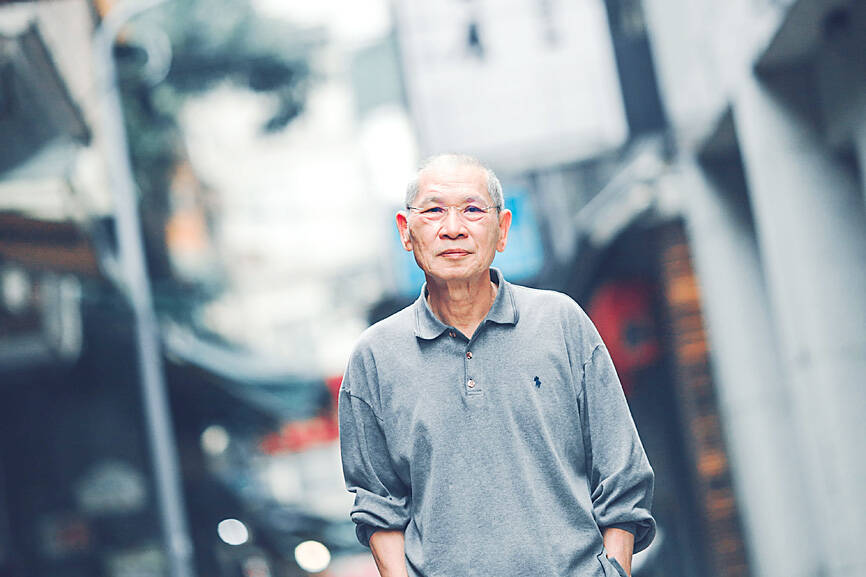The National Museum of Taiwan Literature on Monday announced the winners of the Taiwan Literature Awards (TLA) for Books, with the top prize going to The Book of Wreckage (殘骸書) by Chen Lieh (陳列).
Chen’s work of prose won the 2023 TLA Annual Golden Grand Laurel Award along with NT$1 million (US$30,957) in prize money after it sailed past 190 other submissions, the annual award’s organizing museum said in a statement.
Chen subtly and deftly depicted the suffering and humiliation that has stayed mostly buried while invoking memories and reflection of the White Terror era, using “plain and complex language to revisit history and his personal experiences,” the statement said.

Photo courtesy of Ink Publishing
Chen was sentenced to prison in 1972 for political crimes and spent four years and eight months behind bars.
The book won support from the majority of the judges, who touted Chen’s work as “not only bearing witness to an era, but also set to stun readers from future generations.”
Seven other works were awarded the TLA Golden Book Award, including Bullets are the Remaining Life (子彈是餘生) by Tsao Sheng-hao (曹盛濠, or his pen name, “寺偉哲也”), The Lost River (沒口之河) by Huang Han-yau (黃瀚嶢), and Late Night Patrol of the Abandoned God (夜觀巡場 Ia-kuan Sun-tiunn) by Tiunn Ka-siong (張嘉祥).
The other winners of the Golden Book Award were Brother (弟弟) by Chan Wai-yee (陳偉儀, or her pen name, “陳慧”), Here’s to Us, Bottoms Up (我隨意,你盡量) by Ong Chiau-hoa (王昭華), Mooyi (魔以) by Chen Shu-yao (陳淑瑤) and Eyelids of Morning (鱷眼晨曦) by Zhang Guixing (張貴興).
Each of the Golden Book Award recipients is to receive NT$150,000 in prize money, and Tsao, Huang and Tiunn are to receive an additional NT$150,000 for winning the TLA New Bud Award, an honor presented to writers who have not previously had their works published.
This is the first time that all three winners of the TLA New Bud Award were also recipients of the Golden Book Award, Chao Ching-hua (趙慶華), a literature museum staffer in charge of the awards, said on Tuesday.
The double wins for the three writers also suggests the emergence of new talent, the panel of judges said.
Based on the content of the works submitted in this year’s competition, Taiwanese books appear mainly to focus on themes including national history, coming of age and social movements, the panel said.
In addition to the awards themselves, the panel recognized the influence of subcultures such as anime, comics and games on younger writers, which the panel said has shaped these writers’ imaginations and brought pleasure to readers, while at the same time being critical of reality.
The awards ceremony is to be held at 2:30pm on Saturday next week at the Huashan 1914 Creative Park in Taipei.

The manufacture of the remaining 28 M1A2T Abrams tanks Taiwan purchased from the US has recently been completed, and they are expected to be delivered within the next one to two months, a source said yesterday. The Ministry of National Defense is arranging cargo ships to transport the tanks to Taiwan as soon as possible, said the source, who is familiar with the matter. The estimated arrival time ranges from late this month to early next month, the source said. The 28 Abrams tanks make up the third and final batch of a total of 108 tanks, valued at about NT$40.5 billion

A group from the Taiwanese Designers in Australia association yesterday represented Taiwan at the Midsumma Pride March in Melbourne. The march, held in the St. Kilda suburb, is the city’s largest LGBTQIA+ parade and the flagship event of the annual Midsumma Festival. It attracted more than 45,000 spectators who supported the 400 groups and 10,000 marchers that participated this year, the association said. Taiwanese Designers said they organized a team to march for Taiwan this year, joining politicians, government agencies, professionals and community organizations in showing support for LGBTQIA+ people and diverse communities. As the first country in Asia to legalize same-sex

Travel agencies in Taiwan are working to secure alternative flights for travelers bound for New Zealand for the Lunar New Year holiday, as Air New Zealand workers are set to strike next week. The airline said that it has confirmed that the planned industrial action by its international wide-body cabin crew would go ahead on Thursday and Friday next week. While the Auckland-based carrier pledged to take reasonable measures to mitigate the impact of the workers’ strike, an Air New Zealand flight arriving at Taipei from Auckland on Thursday and another flight departing from Taipei for Auckland on Saturday would have to

MOTIVES QUESTIONED The PLA considers Xi’s policies toward Taiwan to be driven by personal considerations rather than military assessment, the Epoch Times reports Chinese President Xi Jinping’s (習近平) latest purge of the Chinese People’s Liberation Army (PLA) leadership might have been prompted by the military’s opposition to plans of invading Taiwan, the Epoch Times said. The Chinese military opposes waging war against Taiwan by a large consensus, putting it at odds with Xi’s vision, the Falun Gong-affiliated daily said in a report on Thursday, citing anonymous sources with insight into the PLA’s inner workings. The opposition is not the opinion of a few generals, but a widely shared view among the PLA cadre, the Epoch Times cited them as saying. “Chinese forces know full well that